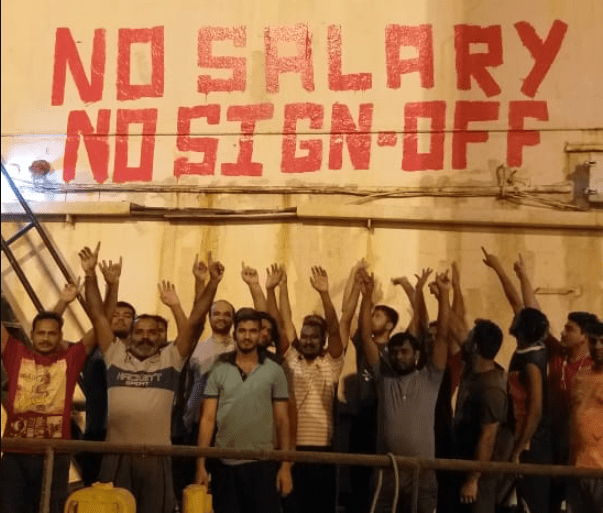Nineteen seafarers from India, Bangladesh, Turkey and Azerbaijan will be able to see their families again this week after their two-year ordeal finally comes to a close.
The seafarers were left abandoned onboard MV Ula bulk carrier as part of a larger crew of 25 when the ship’s owner Aswan Trading and Contracting, stopped paying their wages and providing food, fuel and water in 2019.
One member of the crew had even been trapped aboard the ship for 31 months. Due to appalling conditions on board, the seafarers launched a hunger strike in January 2021, as they were unable to leave the ship or send money to their families in the midst of the COVID-19 pandemic.
The International Transport Workers’ Federation (ITF) contacted the parties with obligations and responsibilities towards the crew in September 2019. This included the Qatari ship owner and their insurer, as well as global agencies – the International Labour Organization (ILO) and the International Maritime Organization (IMO).
Since then, the ITF has been fighting to get the crew food, water and the substantial wages payments that they were owed.
When ITF Arab World and Iran network coordinator Mohamed Arrachedi first got a call for help from the crew, the MV Ula was in Iran and had no lighting, no fuel, and little food and water. In April 2020, the ITF insisted that the vessel be admitted to the port at Shuaiba, in Kuwait, and in May the Kuwait Port Authority took action and detained the ship. The crew was not allowed ashore due to COVID-19 related restrictions.
During this time, wage payments were stopped on several occasions resulting in tensions and even mutiny onboard.
Frustrated with a lack of progress and without pay for the months they had already worked for Aswan prior to the abandonment, six of the crew disembarked in October 2020 once Kuwait’s COVID restrictions had eased. The six seafarers flew home.
The ITF spent much of early 2021 publicising the crew’s case, pushing publicly and privately for Kuwait’s port and maritime authorities to show compassion as the affected port state. Arrachedi from the ITF asked Kuwait to “take the exceptional steps needed to ensure the crew are paid and repatriated”.
Meanwhile, Arrachedi was building a legal case to get the 19 seafarers home with their owed wages. The six seafarers who departed the vessel in October 2019 would later join the legal case.
In early June, Arrachedi received word from the Kuwaiti authorities that the crew, some having been on board as long as 31 months, would finally be going home.
A mix of relief and disbelief gripped the seafarers.
“Our work has not stopped on this case, as we are in contact with the crew, informing them about developments and coordinating with them the legal actions we are taking to try to recover their wages.
“But even if the ship is sold for a good price and all of the wages are returned to these seafarers – what is the human cost? What is the price of this trauma?” Arrachedi asks.
However, as he says there are many other ongoing and incoming abandonment cases.
Arrachedi noted that the ULA had become one of the most notorious cases of modern abandonment.
“It showed an example both of what can happen with the international shipping system and of what should never be allowed to happen,” he said.
“Firstly, we have an employer hiding his true identity and ownership in the ridiculous corporate shadows allowed by the flag of convenience system, so that he can cut a crew loose and not have to face up to the financial and legal consequences of that decision.”
“Then, we have a failure of the flag state, which might as well be a flag of convenience. Palau, like other flags that are popular with dishonest shipowners, fail to enforce the standards that they are supposed to uphold under the Maritime Labour Convention. They are supposed to make the shipowner honour their obligations to crew, and if they can’t – then they should really uphold those obligations themselves.
“And finally, we see in this story a port state sadly more concerned about COVID restrictions than prioritising the payment and repatriation of abandoned seafarers.”
But Arrachedi has some praise for Kuwait’s port and maritime authorities who were able to facilitate the repatriation.
New figures released last week by the ITF show that seafarer abandonment is at an all-time high. The ITF lodged 60 of the record 85 cases which appeared in the International Labour Organisation’s (ILO) abandonment database in 2020.
Just 34 cases were reported to the ILO in 2018, with a slight rise to 40 in 2019. Between 2019 and 2020, the number of cases more than doubled, with the 85 last year representative of hundreds of seafarers who were owed repatriation flights, more than two months’ wages, or both.
ITF Inspectorate coordinator Steve Trowsdale, who oversees the ITF’s global network of 134 inspectors, coordinators, and in-country contacts, said the federation was very concerned over the significant rise in cases of abandonment.
“Certain flag states have failed to ensure their obligations as defined in the Maritime Labour Convention are implemented by shipowners and, when necessary, enforced through action. Failure by these flag states to their job has contributed to the rise of abandonments we are seeing. Clearly, rogue shipowners think they can get away with it – and too many do,” said Trowsdale.
As explained, the financial interests of these flag state registries might have some bearing on their attitudes to policing shipowners.
“Many registries are privatised, run for profit, or both. There is an urgent and long-overdue need to clamp down on the irresponsible registries which allow rogue shipowners to operate and treat seafarers like modern-day slaves,” he said.

